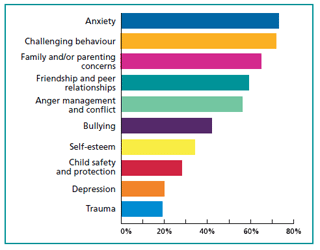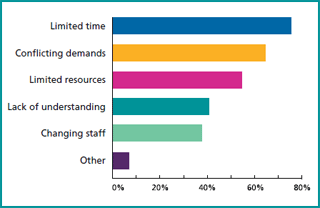Survey of psychologists regarding mental health promotion, prevention and early intervention approaches in schools
The KidsMatter mental health promotion, prevention and early intervention initiative, in which the APS is a major partner, has continued to expand since it first commenced in Australian primary schools in 2006. The 2009 evaluation of the pilot of the KidsMatter initiative in 101 primary schools demonstrated that KidsMatter improved children’s mental health and social and emotional wellbeing, placed mental health on schools' agendas, and increased the knowledge and capacity of teachers and parents to support children’s mental health. The impressive evaluation led the Federal Government to increase funding in 2010 to expand the initiative to more schools across Australia.
The APS has recently conducted a survey of school psychologists to assist in improving the implementation of KidsMatter with feedback from those in the frontline of providing mental health services in schools. The survey aimed to determine the most common mental health issues encountered by psychologists working in primary schools, to understand the barriers to adopting mental health promotion, prevention and early intervention approaches in primary schools, and to capture perceptions of the KidsMatter Primary initiative.
Survey respondents
The survey was sent to all APS members who had indicated in their membership information that they work in primary schools, with a total of 188 psychologists completing the survey. The majority of responses were received from psychologists working in metropolitan areas (71%). Most respondents represented the Government sector (61%) followed by the Independent (26%) and Catholic (13%) sectors. The vast majority of respondents were from New South Wales (33%) and Victoria (30%). Forty-two per cent of respondents indicated that they had worked in school settings as a psychologist for more than 10 years, and 20 per cent from 5 to 10 years. Only five per cent of respondents had worked in schools as a psychologist for less than 12 months. Seventy-one per cent of respondents indicated that they work in more than one school.
Common student problems encountered by school psychologists
Psychologists were asked about the most common issues encountered in their work with students and families in primary school settings. The results are provided in Figure 1, indicating that anxiety (73.1%), challenging behaviour (71.8%), and family and parenting concerns (65.4%) were the most frequent responses, closely followed by friendship and peer relationship difficulties (59%), anger management and conflict resolution (55.8%), and bullying (41.7%).
Psychologists who indicated that ‘challenging behaviour’ was a common issue were asked to specify the behaviours that they most frequently encountered. Psychologists indicated the most frequent challenging behaviours that they deal with are associated with Autism Spectrum Disorder (47%), Attention Deficit Hyperactivity Disorder (38%), Oppositional Defiant Disorder (22%), learning difficulties and cognitive assessments, and Conduct Disorder (19%).

Figure 1. Problems school psychologists most commonly encounter with primary school children (N=156) (respondents were able to endorse as many as applied)
Barriers to implementing promotion, prevention and early intervention models in primary schools
Ninety-seven per cent of school psychologists who responded to the survey indicated that they have a desire to work more from a promotion, prevention and early intervention (PPEI) approach. There were many comments reflecting enthusiasm for more preventative approaches, and the view that such work should be a priority for schools. However, the survey results also highlighted the many barriers to taking a more preventative and proactive approach to children's mental health and wellbeing within primary school settings.

Figure 2. Perceived barriers to working from a mental health PPEI approach in primary schools (N=150) (respondents were able to endorse as many as applied)
As shown in Figure 2, the most frequently cited barriers to working from a PPEI approach were limited time (76%), conflicting demands (65%), limited resources (55%), lack of understanding (41%) and changing staff (34%). Responses highlight the orientation of mental health services in schools as largely reactionary and crisis driven, and that attempts to reorient services to PPEI are met with significant constraints, including staff attitudes and limited resources. Indeed, all the barriers identified are inter-related and feed a cycle which appears to preclude systemic change.
Knowledge of the KidsMatter Primary initiative
Eighty per cent of respondents indicated that they are aware of the KidsMatter Primary initiative, with 22 per cent of respondents working in a primary school that has adopted the initiative. A general understanding of the KidsMatter framework and purpose was evident in many of the responses provided. However many respondents appeared to have limited knowledge of the KidsMatter Primary initiative and its implementation, and the breadth of the initiative. Generally, responses focused on the early intervention end of the initiative and there was less acknowledgement of the more preventative and proactive emphasis of the KidsMatter framework, particularly the component focused on a positive sense of community.
Experience of working with the KidsMatter initiative
Those psychologists who worked in schools that had adopted the KidsMatter Primary initiative (22%) were asked to describe the impact, beneficial aspects and challenges associated with implementing the initiative. Respondents commented on a shift in the focus of their role as a psychologist and of a cultural change occurring within their school. One of the impacts for school staff was identified as a shift in thinking about mental health, resulting in a shared understanding of mental health within the school.Many positive responses were received regarding the empowering impact of the initiative for parents and carers through the provision of information, resources and strategies to support their children.
Psychologists were asked about the most beneficial aspect of the initiative. Responses underline the important role of the KidsMatter Primary initiative in promoting a shared understanding of mental health, challenging misconceptions and stigma, and raising awareness of mental health issues in primary schools. The most challenging aspects of the initiative related to its implementation, particularly considering the many constraints facing schools (e.g., lack of time and resources, and competing demands and priorities). Respondents stressed the importance of school leadership, and all staff being committed to the initiative from the outset with a clear understanding of what is involved.
Summary and conclusions
This survey of a substantial number of school psychologists working in primary school settings has highlighted the prevalence of mental health and behaviour problems seen among children in these settings. The survey has also demonstrated the overwhelming desire of school psychologists to work more with a PPEI approach, indicating the perceived effectiveness of promoting good mental health and tackling mental health and behavioural problems in schools by using this orientation. School psychologists are in an ideal position to influence systemic approaches to promoting good mental health and have the capacity to provide effective early intervention services to children showing behavioural and mental health disturbances.
The survey of school psychologists highlights the barriers to effectively implementing PPEI initiatives in schools. The risk and protective framework utilised by the KidsMatter initiative to assist schools to address children’s mental health has been designed to overcome many of these barriers and has been shown to deliver significant benefits. KidsMatter provides a systematic, whole-school approach. While recognising that school psychologists are critical to children’s mental health, KidsMatter promotes children’s mental health and wellbeing as a shared responsibility of the whole-school community, not just the responsibility of the, often lone, school psychologist. It provides a structured planning process and professional learning to support schools to develop a shared understanding of mental health concepts, and clear policies and procedures within the school for PPEI. It also supports schools to develop effective relationships with health and community agencies so that children who need additional support, beyond what the limited school psychology resources can provide, are more able to access it. KidsMatter also provides a school environment that is conducive to school psychologists working from a more PPEI approach.
The full survey report can be accessed at www.kidsmatter.edu.au/publications/.
For further information on the KidsMatter Primary initiative, go to www.kidsmatter.edu.au/primary/
School psychologists interested in KidsMatter can attend professional learning being offered in each State and Territory and can access further information from the website (www.kidsmatter.edu.au) to discuss the benefits of participating in KidsMatter with their schools.